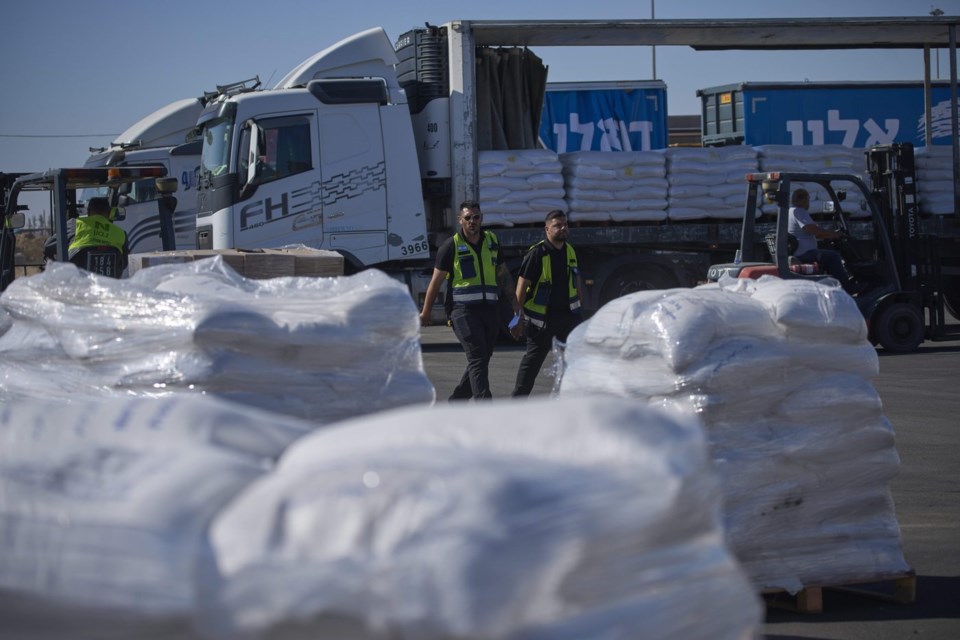OTTAWA — Aid groups say Ottawa has fallen silent as Palestinians face a growing risk of famine in the Gaza Strip — and as one Canadian humanitarian organization pauses aid delivery after accusing Israel of imposing a dangerous distribution system.
"This isn't a humanitarian solution. It is a form of control," Iftikhar Shaikh Ahmad, the chief program officer for Ottawa-based Human Concern International, told a press conference in Ottawa on Thursday morning.
"We have made the difficult decision to pause 17 trucks due to this politicized mechanism."
Israel implemented the distribution system after claiming Hamas is stealing large amounts of aid — a claim that global aid institutions say has not been independently proven.
The Israeli government bars foreign journalists and many international groups from assessing the situation inside the Palestinian territory.
Visiting medical workers describe widespread injuries, particularly among children. Israel insists it is trying to limit civilian casualties while routing Hamas.
Israel's new distribution system, introduced after a nearly three-month blockade, requires Palestinians to wait in pens to receive aid. The system is monitored by Israeli troops and American contractors. On Tuesday, Israeli soldiers fired warning shots when crowds of desperate people rushed for food at one of the distribution centres.
Human Concern International said it has food and medical supplies sitting in Jerusalem that it doesn't feel comfortable taking into the Gaza Strip under this system.
Shaikh Ahmad said each of the 17 trucks carries 2,240 boxes, each of which would provide a family of five with their minimum caloric intake for a week.
"Calories-wise, it's just to keep them alive. It's not something to nourish them and actually prevent diseases," she told the press conference.
Aid groups say that putting a warring party in charge of aid distribution politicizes the process, particularly when Israel is only making aid available in the south — far from the northern areas of Gaza that the Israeli government says it is trying to clear of Palestinians.
The United Nations, which has stopped working with the new system, has said Israel's restrictions on food aid in the territory are creating desperation and increasing the risk of famine.
Save the Children reports kids in Gaza are eating sand, leaves and animal feed.
They are "in the streets with empty bowls looking for food, children with empty bottles looking for clean water. It's a desperate fight for survival," Save the Children local director Rachael Cummings said from Deir al Balah city in Gaza.
There is "very scant evidence" of widespread aid theft by Hamas, Cummings said. Aid groups have implemented safeguards that have prevented the widespread looting by gangs that occurred in January, she insisted.
"Yes, we have had some items taken," she said. "Our community engagement in terms of distributions is a very critical piece to this, in terms of ensuring that the aid goes to the intended recipients."
Oxfam Canada's director of international programs Erin Kiley said the global organization has had more than $3 million in undistributed aid stuck in the region "since Israel imposed a total siege on March." She condemned what she called the militarization or privatization of aid distribution.
"These actions undermine international humanitarian law and set a precedent for occupying powers to dictate the terms of aid based on political agendas and military goals," she told the press conference.
"What we are seeing is not humanitarian aid. It is displacement through deprivation and Canada must not allow its aid to be used in this way."
Aid groups are criticizing Ottawa for saying nothing about the situation in Gaza since Prime Minister Mark Carney and the leaders of France and the United Kingdom issued a joint statement threatening to impose "targeted sanctions" over Israel’s renewed military offensive in Gaza.
The May 19 statement came the same day that Canada signed another joint declaration with Australia, Japan and many European countries accusing Israel of pursuing policies that are causing "starvation."
"Other countries have followed through, reviewing trade and other sanctions. Canada has not," Shaikh Ahmad said. She called on Ottawa to suspend trade with Israel, implement an arms embargo and sanctions and reject the new aid distribution system.
Foreign Affairs Minister Anita Anand has not stopped to speak with reporters on Parliament Hill this week. Her office and department have been asked to respond to criticism from the aid groups.
Industry Minister Mélanie Joly had little to say when asked about the federal government's silence on Thursday.
"This is an important issue. Obviously, this is an issue that is being dealt by the prime minister and the minister of foreign affairs," said Joly, who served as foreign minister until earlier this month.
Liberal MP Rob Oliphant, the former parliamentary secretary to Joly as foreign minister, said he'd rather see Canada foster dialogue than impose sanctions.
"For me, red lines don't work in a situation like this. We need to listen. We need to understand the aspirations of both Palestinians and Israelis," he said.
"Canada needs to play a strong leadership role in finding a way of having reconciliation, having a two-state solution."
When asked about the lack of comment from the federal government since the May 19 joint declaration, Oliphant said it was "a very strong, strong statement."
— With files from Catherine Morrison
This report by The Canadian Press was first published May 29, 2025.
Dylan Robertson, The Canadian Press



